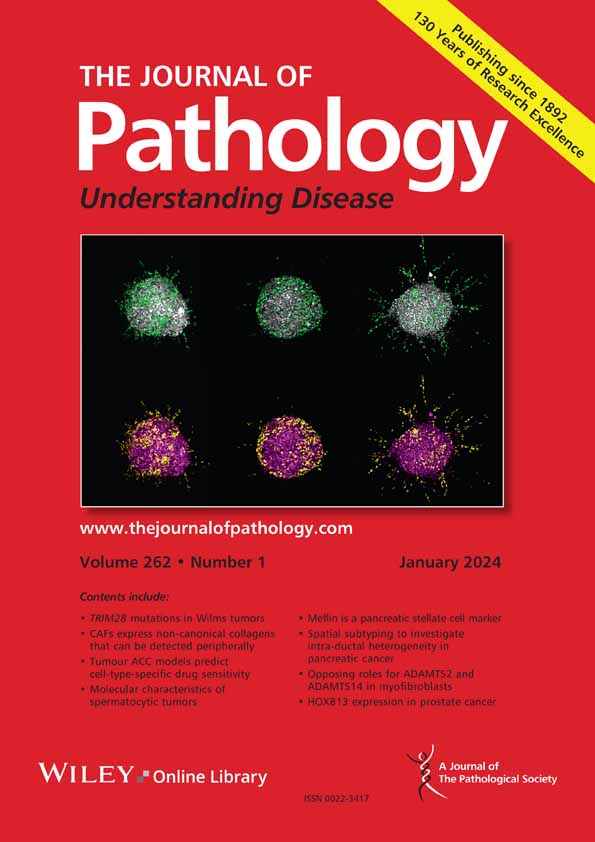Huimei Zou, Min Chen, Xiuhong Wang, Jie Yu, Xiaoying Li, Ying Xie, Jun Liu, Miao Liu, Lifen Xu, Qiong Zhang, Xiaoxue Tian, Fan Zhang, Bing Guo
求助PDF
{"title":"C/EBPβ亚型对狼疮性肾炎肾损伤足细胞焦下垂的特异性调控","authors":"Huimei Zou, Min Chen, Xiuhong Wang, Jie Yu, Xiaoying Li, Ying Xie, Jun Liu, Miao Liu, Lifen Xu, Qiong Zhang, Xiaoxue Tian, Fan Zhang, Bing Guo","doi":"10.1002/path.6174","DOIUrl":null,"url":null,"abstract":"<p>As an essential factor in the prognosis of systemic lupus erythematosus (SLE), lupus nephritis (LN) can accelerate the rate at which patients with SLE can transition to chronic kidney disease or even end-stage renal disease. Podocytes now appear to be a possible direct target in LN in addition to being prone to collateral damage from glomerular capillary lesions induces by immune complexes and inflammatory processes. The NLRP3 inflammasome is regulated by CCAAT/enhancer-binding protein β (C/EBPβ), which is involved in the pathogenesis of SLE. However, the role and mechanism of C/EBPβ in LN remain unclear. In this investigation, glomerular podocytes treated with LN serum and MRL/lpr mice were employed as <i>in vivo</i> and <i>in vitro</i> models of LN, respectively. <i>In vivo</i>, the expression of C/EBPβ isoforms was detected in kidney specimens of humans and mice with LN. Then we assessed the effect of C/EBPβ inhibition on renal structure and function by injecting RNAi adeno-associated virus of C/EBPβ shRNA into MRL/lpr mice. <i>In vitro</i>, glomerular podocytes were treated with LN serum and C/EBPβ siRNA to explore the role of C/EBPβ in the activation of the AIM2 inflammasome and podocyte injury. C/EBPβ-LAP and C/EBPβ-LIP were significantly overexpressed in kidney tissue samples from LN patients and mice, and C/EBPβ inhibition significantly alleviated renal function damage and ameliorated renal structural deficiencies. Inflammatory pathways downstream from the AIM2 inflammasome could be suppressed by C/EBPβ knockdown. Furthermore, the upregulation of C/EBPβ-LAP could activate the AIM2 inflammasome and podocyte pyroptosis by binding to the promoters of <i>AIM2</i> and <i>CASPASE1</i> to enhance their expression, and the knockdown of AIM2 or (and) caspase-1 reversed the effects of C/EBPβ-LAP overexpression. Interestingly, C/EBPβ-LIP overexpression could transcriptionally inhibit IRAG and promote Ca<sup>2+</sup> release-mediated activation of the AIM2 inflammasome. This finding suggests that C/EBPβ is not only involved in the regulation of the expression of key proteins of the AIM2 inflammasome but also affects the polymerization of key proteins of the AIM2 inflammasome through the regulation of Ca<sup>2+</sup> release. In conclusion, this study provides a new idea for studying the regulatory mechanism of C/EBPβ and provides a theoretical basis for the early diagnosis and treatment of LN in the future. © 2023 The Pathological Society of Great Britain and Ireland.</p>","PeriodicalId":232,"journal":{"name":"The Journal of Pathology","volume":"261 3","pages":"269-285"},"PeriodicalIF":5.6000,"publicationDate":"2023-08-21","publicationTypes":"Journal Article","fieldsOfStudy":null,"isOpenAccess":false,"openAccessPdf":"","citationCount":"0","resultStr":"{\"title\":\"C/EBPβ isoform-specific regulation of podocyte pyroptosis in lupus nephritis-induced renal injury\",\"authors\":\"Huimei Zou, Min Chen, Xiuhong Wang, Jie Yu, Xiaoying Li, Ying Xie, Jun Liu, Miao Liu, Lifen Xu, Qiong Zhang, Xiaoxue Tian, Fan Zhang, Bing Guo\",\"doi\":\"10.1002/path.6174\",\"DOIUrl\":null,\"url\":null,\"abstract\":\"<p>As an essential factor in the prognosis of systemic lupus erythematosus (SLE), lupus nephritis (LN) can accelerate the rate at which patients with SLE can transition to chronic kidney disease or even end-stage renal disease. Podocytes now appear to be a possible direct target in LN in addition to being prone to collateral damage from glomerular capillary lesions induces by immune complexes and inflammatory processes. The NLRP3 inflammasome is regulated by CCAAT/enhancer-binding protein β (C/EBPβ), which is involved in the pathogenesis of SLE. However, the role and mechanism of C/EBPβ in LN remain unclear. In this investigation, glomerular podocytes treated with LN serum and MRL/lpr mice were employed as <i>in vivo</i> and <i>in vitro</i> models of LN, respectively. <i>In vivo</i>, the expression of C/EBPβ isoforms was detected in kidney specimens of humans and mice with LN. Then we assessed the effect of C/EBPβ inhibition on renal structure and function by injecting RNAi adeno-associated virus of C/EBPβ shRNA into MRL/lpr mice. <i>In vitro</i>, glomerular podocytes were treated with LN serum and C/EBPβ siRNA to explore the role of C/EBPβ in the activation of the AIM2 inflammasome and podocyte injury. C/EBPβ-LAP and C/EBPβ-LIP were significantly overexpressed in kidney tissue samples from LN patients and mice, and C/EBPβ inhibition significantly alleviated renal function damage and ameliorated renal structural deficiencies. Inflammatory pathways downstream from the AIM2 inflammasome could be suppressed by C/EBPβ knockdown. Furthermore, the upregulation of C/EBPβ-LAP could activate the AIM2 inflammasome and podocyte pyroptosis by binding to the promoters of <i>AIM2</i> and <i>CASPASE1</i> to enhance their expression, and the knockdown of AIM2 or (and) caspase-1 reversed the effects of C/EBPβ-LAP overexpression. Interestingly, C/EBPβ-LIP overexpression could transcriptionally inhibit IRAG and promote Ca<sup>2+</sup> release-mediated activation of the AIM2 inflammasome. This finding suggests that C/EBPβ is not only involved in the regulation of the expression of key proteins of the AIM2 inflammasome but also affects the polymerization of key proteins of the AIM2 inflammasome through the regulation of Ca<sup>2+</sup> release. In conclusion, this study provides a new idea for studying the regulatory mechanism of C/EBPβ and provides a theoretical basis for the early diagnosis and treatment of LN in the future. © 2023 The Pathological Society of Great Britain and Ireland.</p>\",\"PeriodicalId\":232,\"journal\":{\"name\":\"The Journal of Pathology\",\"volume\":\"261 3\",\"pages\":\"269-285\"},\"PeriodicalIF\":5.6000,\"publicationDate\":\"2023-08-21\",\"publicationTypes\":\"Journal Article\",\"fieldsOfStudy\":null,\"isOpenAccess\":false,\"openAccessPdf\":\"\",\"citationCount\":\"0\",\"resultStr\":null,\"platform\":\"Semanticscholar\",\"paperid\":null,\"PeriodicalName\":\"The Journal of Pathology\",\"FirstCategoryId\":\"3\",\"ListUrlMain\":\"https://onlinelibrary.wiley.com/doi/10.1002/path.6174\",\"RegionNum\":2,\"RegionCategory\":\"医学\",\"ArticlePicture\":[],\"TitleCN\":null,\"AbstractTextCN\":null,\"PMCID\":null,\"EPubDate\":\"\",\"PubModel\":\"\",\"JCR\":\"Q1\",\"JCRName\":\"ONCOLOGY\",\"Score\":null,\"Total\":0}","platform":"Semanticscholar","paperid":null,"PeriodicalName":"The Journal of Pathology","FirstCategoryId":"3","ListUrlMain":"https://onlinelibrary.wiley.com/doi/10.1002/path.6174","RegionNum":2,"RegionCategory":"医学","ArticlePicture":[],"TitleCN":null,"AbstractTextCN":null,"PMCID":null,"EPubDate":"","PubModel":"","JCR":"Q1","JCRName":"ONCOLOGY","Score":null,"Total":0}
引用次数: 0
引用
批量引用

 求助内容:
求助内容: 应助结果提醒方式:
应助结果提醒方式:


